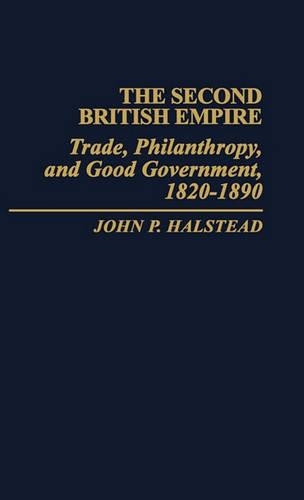
The Second British Empire: Trade, Philanthropy, and Good Government, 1820-1890
(Hardback)
Publishing Details
The Second British Empire: Trade, Philanthropy, and Good Government, 1820-1890
By (Author) John P. Halstead
Bloomsbury Publishing PLC
Praeger Publishers Inc
30th June 1983
United States
Classifications
Tertiary Education
Non Fiction
325.34109
Physical Properties
Hardback
261
Width 140mm, Height 216mm
510g
Reviews
Halstead argues that the imperialism of Britain is best understood when viewed as an auxiliary of foreign policy'.... After developing his thesis, Halstead illustrates it with eight Asian and African case studies, in each case determining the moment when Britain established paramountcy.... Each case demonstrates a special combination of some or all of the three motives for expansion of control. The book is a graduate student's delight: succinct summaries of major interpretations of imperialism, lucid argument, brief case-study summaries, and extremely useful annotated bibliography. It should be in all university libraries and it will also be useful to advanced undergraduates.-Choice
This succinct but forceful analysis of British imperialism in the nineteenth century argues that the motives for the British acquisition of African and Asian real estate lie embedded in the three themes of Trade, Philanthropy, and Good Government. ... This is a delightful book, the product of many years meandering through the primary and secondary sources and much thought. A splendid introduction to the founding of the second British empire, it will hold, as well, the attention of the most hardened veterans of the study of imperialism.-Albion
"This succinct but forceful analysis of British imperialism in the nineteenth century argues that the motives for the British acquisition of African and Asian real estate lie embedded in the three themes of Trade, Philanthropy, and Good Government. ... This is a delightful book, the product of many years meandering through the primary and secondary sources and much thought. A splendid introduction to the founding of the second British empire, it will hold, as well, the attention of the most hardened veterans of the study of imperialism."-Albion
"Halstead argues that the imperialism of Britain is best understood when viewed as an auxiliary of foreign policy'.... After developing his thesis, Halstead illustrates it with eight Asian and African case studies, in each case determining the moment when Britain established paramountcy.... Each case demonstrates a special combination of some or all of the three motives for expansion of control. The book is a graduate student's delight: succinct summaries of major interpretations of imperialism, lucid argument, brief case-study summaries, and extremely useful annotated bibliography. It should be in all university libraries and it will also be useful to advanced undergraduates."-Choice
Author Bio
lstead /f John /i P.
